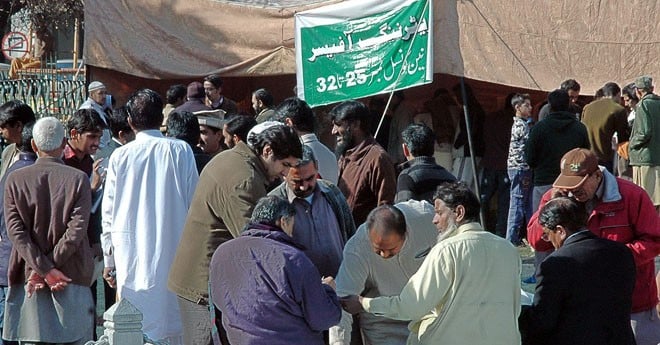

Local government elections are in the news big-time. Although the ruling party and other parties are reluctant to conduct the said polls, there is hope that this grass-root level activity shall take place as it was done in Balochistan.
So, those who are interested in assuming positions of power at the local level are on the forefront. Hoardings, steamers, banners and posters have captured every nook and corner of the city. Official sources say 14,991 candidates have submitted their nomination forms for as many as 274 Union Councils of Lahore. 1,522 candidates have submitted nomination papers for the seats of Chairman and Vice Chairman; 7,608 for general members, 2,031 for women members, 1,574 for worker members, 1,288 for youth, and 968 for minority member seats.
According to the Punjab Local Government Act 2013, a Union Council shall consist of directly elected Chairman and Vice Chairman, as joint candidates, six general members, one from each ward of the Union Council, two women members, one peasant member in a rural Union Council or one worker member in an urban Union Council, one youth member and one non-Muslim member.
TNS has learnt that many of the candidates for the seats of Chairman and Vice Chairman are those who have some political background and enjoy a reputation of working for the welfare of the general public in their respective areas. But there are people who (allegedly) do not boast a good reputation and an academic background.
Candidates with no clear or stated vision are said to have submitted their nomination forms while others who are known to be great planners have shown no interest in contesting even at the local level where the activity is not a burden on their pockets.
Shahzad Rauf from Union Council 78, Sanda Kalan, is a blue-collar worker in an office but he is contesting for the general member seat as he is said to be a political party worker also. Sure, it is his right to contest the polls but can he ably represent the educated people of his area? No one knows.
"I shall work for the betterment of the area; I hope to provide [the area people with] street lights and a proper sewerage system," he announces.
God knows it’s one of the many clichéd lines one has heard every man jack in politics utter. For Rauf, he can deliver well with the support he has of the ruling party.
Middle-aged Syed Murtaza Hussain from Union Council 53 of Shad Bagh works in a government department. He says that being a government employee, he cannot contest the election but he desperately wants to do so as "a lot of candidates who are being fielded do not enjoy the support of the people of the area.
"But they have the resources and the clout." Period.
One candidate is said to be a TV cable network operator while another two are property dealers.
Muhammad Ishaq has Masters’ Degree in Political Science from a local university. He is a young and energetic fellow from Union council 115, Thokar Niaz Baig. He is passionate about working for the betterment of the area but for the purpose, he does not like to contest the election even at Union council level because he thinks "it’s a dirty game.
"I know I cannot win the election as the candidates who are battling are influential enough, even though they may not have the required qualification and vision. The money they have earned by using all the means."
The situation looks bleak when you find how certain qualified people would be left behind. One interesting observation: no candidate for any seat from the Union Council boasts an educational certificate higher than that matriculation.
The situation is no different in other parts of the city. A random visit to the different Union councils of the city reveals near-similar stories in Union Council 78 Sanda, Union Council 116 Thokar Niaz Baig, Union Council 41 Harbanspura, Union Council 132, 141, 142 of Wagah Town and Union Council 90, 91 of Samanabad. The advertisement material shows that these candidates are being backed by different political parties.
The need of the hour is to have such people in the corridors of power who have displayed leadership qualities and a proper planning in the past. They are able to represent the public in a better way on various higher forums.
Dr Ambreen Javaid, Head of Political Science department, Punjab University, says that dynastic politics and ‘baradari-ism’ are eating into the roots of true leadership.
"The educated class does not believe in these [local polls] things, so they avoid taking part and, therefore, can escape exploitation," she says.
"But now we can see a change coming about," she adds. "The people are becoming more and more aware of things in general. They know their rights better now. Still, it will take some time for us to witness a complete change."